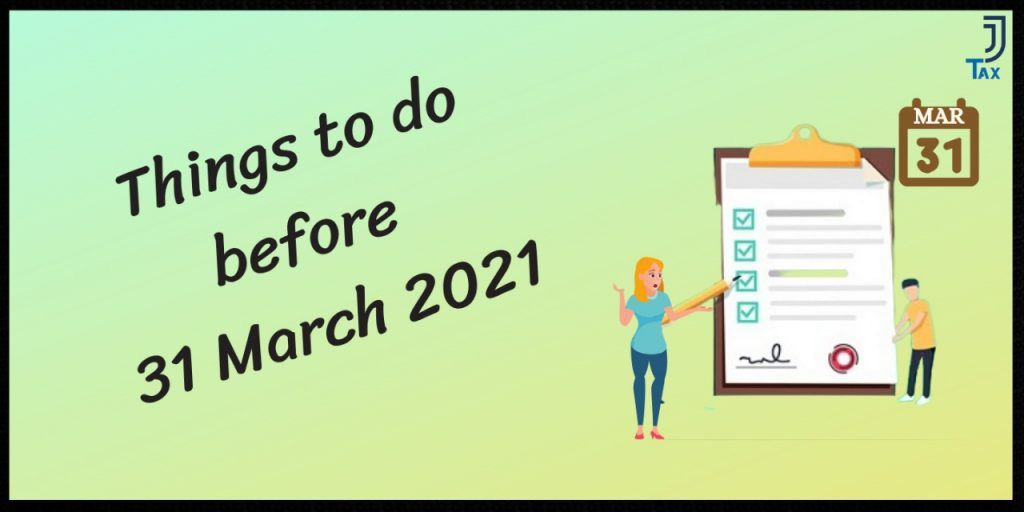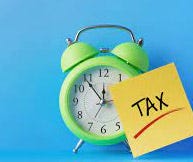Important things to do before 31st March 2021
31st March 2021 is an important date by which important financial and compliance obligations should be fulfilled.
We have come up with a complete list of compliances that are required to be followed before 31st March 2021.
A. Deposit Advance Tax for FY 2020-21
Every person, whose estimated tax liability for the FY 2020-21 is Rs. 10,000 or more, is required to pay advance tax in installments of 15%, 45%,75%, and 100% on or before 15 June, 15 September, 15 December and 15 March respectively.
In the case of a person opting for presumptive taxation u/s 44AD, advance tax is to be paid in a single installment on or before 15th March 2021.
Nevertheless, tax paid on or before 31st March 2021 is considered as advance tax for the relevant financial year.
To avoid penal provision u/s 234C, every person is required to pay advance tax on time.
B. Make Investments and Save tax for FY 2020-21
Do not procrastinate and postpone your tax planning to the last date i.e. 31st March 2021 for making investments. Eligible investments should be made on or before 31st March 2021 to save tax for FY 2020-21.
Make investments that are eligible for deductions u/s 80C to avail the maximum tax benefit of Rs.1,50,000 such as investments in ELSS (Equity linked saving scheme), PPF (Public Provident fund), EPF (Employees Provident fund), Fixed Deposits for tenure more than 5 years, etc.
Investments in Medical Insurance premium, preventive health check-up, and medical treatment u/s 80D is eligible for a maximum deduction of Rs. 50,000.
Refer to Annexure-I for a detailed list of investments under section 80C.
C. Belated and Revised ITRfor FY 2019-20
Belated Return If a person has failed to file his return within the due date for the FY 2019-20, then he can file a belated return on or before
31st March 2021.
Revised Return If a person has already filed his return for FY 2019-20 and discovers any omission/mistake subsequently, such person can revise his return and file a revised return on or before 31st March 2021.
D. Linking Aadhar Number with PAN
Every person already holding PAN on 1st July 2017, shall link Aadhar with PAN on or before
31st March 2021.PAN will become inoperative immediately after the due date if not linked with Aadhar.
This can be done through the Income Tax E-Filing website.
E. Avail benefit of Vivad se Vishwas scheme
Vivad se Vishwas scheme was announced in Budget’2020 for settling pending tax disputes between individuals and Income tax department. The main aims of this scheme are to get relief from pending disputes by paying disputed tax and get a waiver from payment of interest and penalty and also get immunity from prosecution.
Individuals can file a declaration on or before 31st March 2021 to avail of the benefit under this scheme
The last date for payment of disputed tax without additional interest under VSV is 30th April 2021.
Income tax disputes settled under this scheme cannot be re-opened in any other proceeding by the Income-tax department or any other designated authority.
F. TDS/TCS return filing due dates for FY 2020-21
The last date for filing TDS and TCS returns for Quarter 1 and Quarter 2 i.e.for 1st April 2020 to 30th June 2020 and 1st July 2020 to 30th September 2020 is 31st March 2021.
Failure to comply with the due date deadline attracts a late fee u/s 234E of Rs. 200 per day, subject to the maximum amount of TDSin default
G. Filing of GSTR 9 and 9C for FY 2019-20
GSTR 9 is an annual return mandatory to be filed by taxpayers whose aggregate turnover for FY 2019-20 exceeds Rs.2crores for FY 2019-20.
GSTR 9C is a statement of reconciliation between the GTR 9and audited financial statements of the taxpayer. It is required to be filed by taxpayers whose aggregate turnover for
FY 2019-20 exceeds Rs. 5 crores.The due date to file GSTR 9 and GSTR 9C has been extended several times for multiple purposes such as complexities in the form and filing. As per the latest notification, the last date to file GST 9 & 9C for FY 2019-20 31st March 2021
H. Set off of Losses
House Property Loss
· Such loss can be carried forward up to 8 years from the year in which loss was incurred.
· Carry forward loss can be set off against income from house property only.
· FY 20-21 is the last year for setting off losses for FY 2012-13, Such losses will lapse if they remain unadjusted.
Capital Loss
· Short-term and long-term capital gains can both be carried forward up to 8 years from the year in which loss was incurred.
· Short term losses can be set off against short term as well as long term capital gains.
· However, long-term capital losses can only be set off against long-term capital gains.
· FY 20-21 is the last year for setting off losses for FY 2012-13, Such losses will lapse if they remain unadjusted.
Business Loss
· Business loss can be carried forward up to 8 years from the year in which loss was incurred.
· In the subsequent years, the business loss can be set off only against income from the business.
· FY 20-21 is the last year for setting off losses for FY 2012-13, Such losses will lapse if they remain unadjusted.
Loss from specified business under section 35AD like cold chain storage, operating warehouse, housing projects, can be carried forward indefinitely.
Hurry up!!!!! The financial year is ending soon
Don’t miss out on the above-mentioned points as it will help in keeping you compliant and will save you unnecessary penalties.
Annexure I: Eligible deductions under section 80C:
Investment in PPF: You can claim a deduction maximum of ₹50 Lakh in a year. Receipts on maturity and withdrawal are tax-free.
Investment in National savings certificate: National Savings Certificate is eligible for deductions in the year they are purchased. Interest accrued on such certificates is eligible for tax deductions each year under section 80C but becomes taxable at the time of maturity.
Investment in Fixed Deposit: Interest earned on fixed deposits with tenure of not less than five years are eligible for tax deduction under section 80C.
For senior citizens, tax-exempted interest income on deposits with banks has been increased from ₹ 10,000 to ₹ 50,000.
Further, TDS will not be required to be deducted under section 194A and it has been extended to all FD and RD schemes
Premium on Life Insurance Policy: You can claim a deduction under section 80C for the premium paid for a life insurance policy as per the income tax act.
Contribution to Employee Provident Fund: You can claim a tax deduction for the contribution made in the employee provident fund under section 80C.
Equity-oriented Mutual Funds: You can claim a tax deduction for the investment made in any unit of mutual funds whether it is listed on a stock exchange or not.
Repayment of Principal on Housing Loan: You can claim a tax deduction on the principal amount paid for a Home loan under section 80C.
Tuition Fees: You can claim a tax deduction for the tuition fees paid under section 80C. The deduction is available for 2 children for each individual. Thus, the deduction for up to 4 children can be claimed, 2 by each parent.
Others: Deposit in notified bonds of NABARD, senior citizen saving scheme, pension scheme of UTI or MF, Sukanya samridhi scheme account.






